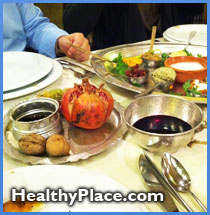Food and Your Moods Online Chat Transcript

![]()
Dr. Kathleen DesMaisons, a nutrition expert, joined us to talk about how sugar addiction can affect your mood, causing you to be depressed as well as overweight. She also discusses ways to cure your addiction to sugar through a high carbohydrate diet.
David Roberts is the HealthyPlace.com moderator.
The people in blue are audience members.
David: Good Evening. I'm David Roberts. I'm the moderator for tonight's conference. I want to welcome everyone to HealthyPlace.com. I'm glad you had the opportunity to join us and I hope your day went well. Our topic tonight is "Food and Your Moods." Our guest is Dr. Kathleen DesMaisons, an expert in addictive nutrition and the author of Potatoes Not Prozac.
Dr. DesMaisons maintains that the same brain chemicals that are altered by antidepressant drugs are also affected by the foods we eat. According to her, many people, including those who are depressed, are "sugar sensitive." Eating sweets gives them a temporary emotional boost, which leads to a craving for still more sweets. The best way to keep these brain chemicals in the right balance and keep blood-sugar levels steady, she says, is through the dietary plan she describes in Potatoes Not Prozac.
Good evening, Dr. DesMaisons and welcome to HealthyPlace.com. We appreciate you being our guest tonight. On your site, you describe yourself as a former sugarholic who was chronically overweight. Can you tell us a little more about yourself, please?
Dr. DesMaisons: I was the child of an alcoholic who was depressed, overweight, and moody. I was smart and committed to my health, but it seemed that no matter what I did, I still felt so bad. I had no idea that my eating was contributing to the problem - sometimes I felt crazy without an answer. Twelve years ago I started to explore working with food and diet in the alcoholism treatment center I was running. We got spectacular results! I applied the same ideas to myself and everything changed as the food changed!
David: Can you please define or explain what sugar sensitivity is?
Dr. DesMaisons: It is a theory I developed to explain a three-part problem: reactive blood sugar, low serotonin, and low beta endorphin which can all be inherited from an alcoholic or sugar sensitive parent. Each of these can make us be depressed, have mood swings and low impulse control. I wanted to develop a solution using nutrition.
David: Obviously, sweets are one type of food with sugar. What other types of foods are you referring to?
Dr. DesMaisons: White things - refined flour products such as bread and pasta. Many people who are sugar sensitive use these foods addictively but don't realize that is what is going on. They have no idea that food can affect how they feel so profoundly.
David: When you say, "use these foods ADDICTIVELY," what do you mean by that?
Dr. DesMaisons: Well, just as if they are a drug - sugar actually affects the same part of the brain as heroin or morphine, so we use it to feel better and have withdrawal when we don't get our drug. We only notice that we feel really good when we have sweet stuff, but don't make the connection to when we feel bad as withdrawal.
David: Here's an audience question that relates to what we are talking about:
radiantmb:: How does eating sugar make you depressed? I usually feel much better after eating sugary foods.
Dr. DesMaisons: Sugar evokes beta endorphin which absolutely makes you feel better - until it wears off and then you feel depressed, but you don't make the connection of the down being an aftereffect of the sugar. The problem comes in needing more and more and more often, or in thinking that the down feelings are signs of clinical depression rather than the sugar low. Sometimes people get them mixed up and think they are not getting better, when it is the food making them feel so bad.
David: We have many visitors to our site who have many different types of psychological disorders. Many take medications to ease their depression. Are you suggesting that they don't need Prozac or other antidepressants if they control their diets properly?
Dr. DesMaisons: Absolutely not, but I am suggesting that their symptoms can be made worse by what they eat or don't eat. For example, Prozac does not make new serotonin, it simply recycles the serotonin you already have. By changing the food, you can actually increase the production of serotonin in the brain without any side effects or any cost. I encourage people to change their diet and see how they feel - usually it significantly enhances the effectiveness of the medications.
David: I'm wondering, do you suggest eating 3 meals a day, or little meals throughout the day?
Dr. DesMaisons: Well, I always suggest that people start with having breakfast every day with some sort of protein and a complex carbohydrate. That is the first step of seven and usually it takes weeks to master.
People who are sugar sensitive HATE to have breakfast, because when you don't eat, your body releases beta endorphin and it makes you feel confident and strong, until it wears off!!! Then you feel horrible.
After you master breakfast, then I suggest working on three meals because starting and stopping is very good for your brain. It help to reinforce impulse control or the ability to say no.
David: We have many audience questions. Let's get to a few of those:
jenny23: How do you suggest controlling your meals like that?
Dr. DesMaisons: You start with baby steps. You do NOT try to go off of sugar in the beginning, and you just focus on one thing - breakfast with protein every day.
tinesangel: Are you saying foods with sugar can cause depression?
Dr. DesMaisons: No, I am saying they can contribute to depression. As I am sure you know, depression is a very complex, multifaceted issue, but I do believe that sometimes people are diagnosed for symptoms that come from sugar sensitivity rather than straight clinical depression. We have had thousands tell us that they cannot believe how much better they feel when they change their diets and that sugar makes them crash, even though in the short run it seems like a solution.
David: We have a lot of information about depression in the HealthyPlace.com Depression Community.
TinaB: Do you find that even though we are called 'sugar sensitive', some folks may have a big problem with pasta and breads as triggers rather than sugar?
Dr. DesMaisons: Yes, sometimes those foods can be a bigger problem - especially since we are told that things like pasta are so healthy!!!
David: What's it feel like quitting sugar?
Dr. DesMaisons: Oh my goodness!!!! It's like drug withdrawal! Let me go through the phases.
It takes about 5 days. At first you feel excited and ready, then you get cranky, and then, on the 4th day, you get nasty!! On the 5th day, you wake up and you feel like you died and went to heaven!!! But I do NOT recommend you go off of sugar until you set the foundation. Going off of sugar is the 6th of seven steps!
topmom: Why does your theory relate to "alcoholic" parents?
Dr. DesMaisons: Because the biochemistry of sugar sensitivity is so closely connected to the biochemistry of alcoholism. I think that sugar sensitivity is a gate to alcoholism for some. For many of us, we stay with sugars and food, but for many it drifts over to alcohol. We inherit the biochemical predisposition and it manifests in different ways.
daffyd: You talk about sugar addiction... My problem is that I am addicted to salt and salty foods. How does that relate to your theory?
Dr. DesMaisons: Well it may or may not be connected. You may be addicted to the foods that carry the salt or you may be addicted to the biochemical response that the salt creates in your body. Without knowing your whole story, I don't really know.
David: Also, and please correct me if I am wrong about this Dr. DesMaisons, but many foods that we think don't contain sugar, do.
Dr. DesMaisons: Absolutely true! Sugars are hidden everywhere!!!
EmilyAnne: I once went on a low carbohydrate/high protein diet. After 2-3 weeks I got EXTREMELY depressed and had to stop. Was that withdrawal, or maybe related to the tryptophan/carb connection?
Dr. DesMaisons: Absolutely, those diets actually DEPLETE serotonin, to say nothing of the trauma of sugar withdrawal in stopping that quickly!
What I am trying to do is actually enhance the level of serotonin very carefully. I want to give people a way to understand their own biochemistry so they can work WITH it to feel better.
anothernewone: Is there anywhere one can go when they already have many food allergies (now this is one more thing to eliminate)? I feel much better without sugar, but it's so very hard to say no all day long!
Dr. DesMaisons: No, this is about abundance, not deprivation. The plan I have actually helps to heal allergies. And you don't start taking anything out for a long time. You mostly work at putting things in. I know it is terrifying to think about giving up something which provides so much comfort!
Remember, I am a sugar addict, I KNOW the feelings and the fear, and how hard it is. We are talking about a very simple, very slow, and sort of boring solution. This is NOT a weight loss plan, this is a plan to heal your brain chemistry!
blusky: What's the best eating plan for anxiety disorder?
Dr. DesMaisons: Here is the exciting thing. The plan in the book seems to help a lot of different kinds of issues: depression, anxiety, compulsion. For example, I have treated many people with anxiety and panic disorder, and no one ever asked how much caffeine and sugar they were having, no one!! When they changed the food, things sure settled down!
nirv: In a nutshell what do you recommend "we" should eat to be more balanced?
Dr. DesMaisons: Breakfast with protein and a complex carbohydrate, three meals a day with protein at each (and some complex carbs), and a potato before bed with butter or olive oil on it. This is why the book has potatoes in the title!
David: Just to clarify, Dr. DesMaisons, are you suggesting that people cut out ALL sugar?
Dr. DesMaisons: AFTER they do the other steps, not before, and I recommend being reasonable. I don't think the sugar in ketchup matters so much as 12 cans of coke a day, or cake and candy! I am mostly talking about the big sugars.
adia24: What foods increase serotonin?
Dr. DesMaisons: Protein provides tryptophan in the blood but you have to have a carbohydrate snack three hours later to get the tryptophan up into the brain, hence the potato three hours after dinner. If you only have carbs, there is no raw material. If you don't have the carb snack, you only get tryptophan in your blood, not in your brain.
gailz: So what is so special about the potato?
Dr. DesMaisons: It is tasty, easy to fix, warm, cheap and creates an insulin punch that does the job. Of course, the fact that I am IRIS never influenced my choice!
David: Also can you define complex carbohydrates and give a few examples of what they are?
Dr. DesMaisons: Brown things rather than white (a highly scientific descriptor ). High fiber foods, brown rice, whole wheat, things like that.
David: That makes it simple :)
Dr. DesMaisons: Yes, this is a very simple plan. Shift from white to browns!!!
Nerak: I have heard that some diabetics tend to suffer from depression. I am diabetic and suffer from depression. Is there a correlation between the 2?
RocknBead: Can this type of diet help prevent diabetes?
Dr. DesMaisons: There seems to be a big correlation. I think the blood sugar volatility makes depression worse. By the way, if you are diabetic you should use a sweet potato or something like Triscuits rather than a regular potato.
David: Dr. DesMaisons website is here: http://www.radiantrecovery.com/
David: Here are a few audience comments about what's being said tonight, then we'll continue with the questions:
sad: I cut out sugar and white flour.... It was not so hard to do and it really helped.
anothernewone: I'm so limited at what I can put 'in.' I'm gluten sensitive.
Laurie W: Do you have much success with people who have a LOT of weight to lose? I am really overweight (150 pounds over).
Dr. DesMaisons: Actually, we do, but it is not sexy or glamorous. It is slow and effective because we are HEALING what got you there in the first place. Some people stay fixated on the pounds. I work to moving people towards radiance which is a much bigger issue.
David: I do want to mention again, what was said earlier, Dr. DesMaisons is not encouraging anyone to quit taking their medications... and certainly you should never do that on your own, without consulting your doctor first.
Dr. DesMaisons: Absolutely, we always tell people to talk to their doctors.
David: This is not a substitute for your medications, but rather an adjunct, something you can do in addition, as a way to further help yourself.
Dr. DesMaisons: Often they get the book from their doctor, in fact! It will make the medication more effective and also help you sort out the deeper issues.
EmilyAnne: Do you have any thoughts on caffeine?
Dr. DesMaisons: Many!! Oops, my own struggles are showing! Caffeine is a drug, no getting around it. Caffeine in moderation can help depression, but caffeine in bigger amounts can create havoc and certainly contribute to things like panic disorder. The let down from caffeine withdrawal can make depression much worse.
I also think that many health care people don't understand the relationship between these things and psychotropic dugs. They all interact and it is important to see how they fit so you know which are psychiatric symptoms and which are food or caffeine induced symptoms.
RocknBead: Any advice to a vegetarian just starting your plan?
sad: One thing that makes me nervous is the protein. I don't eat meat or fish, and only small amounts of chicken. What do you do when people are vegetarians?
Dr. DesMaisons: We have many, many vegetarians doing the program. You can get protein from many sources other than meat or fish or chicken, but you do have to work at it to get enough. Lots of people are doing it very successfully. We actually have a special e-list for the vegetarians to help sort it out.
mermaid77: Kathleen, do people doing your program get off of their anti-depressants?
Dr. DesMaisons: Many do. I tell them to do the food steady for 6 months, see how they feel, and then talk with their doctors. There are some for whom the food is not enough, and I tell them to get medicine. We have a very skilled community to support people in finding out how the food fits, but I never encourage someone to drop the medications in favor of the food right off he bat - that would be NUTS!!!
David: Again, though, that is something you should definitely discuss with your medical doctor/psychiatrist.
Kathyb31: What is it with Diet Sodas? What's the addiction?
Dr. DesMaisons: hmm... This one is fascinating. Diet soda has an amino acid called phenyalanine. It is a precursor to dopamine, the neurotransmitter affected by cocaine and amphetamine. Dopamine makes us feel bright and able to take on the world. I think diet stuff activates that response, so we feel really good with it, but if we go off it we actually feel awful. In fact, I experienced a severe depression after flirting around with it. I had no idea what was happening since I don't generally suffer from depression. My first clue came when I had a dose and felt fine. Whew, what a surprise! I don't think people should drink it. It is nasty on the brain!
David: Here's an audience comment:
mermaid77: I see that as my goal. I'm gaining weight steadily, but I really want to do your program because it has worked so well for me in the past. I have regained 50lbs. from 104 lb. weight loss 4 years ago and am back on sugar and miserable.
RocknBead: I am on day 4 of the SARP, and knowing that step 6 is ahead of me, I want to eat lots of my favorite sugar foods NOW! Is that addiction?
Dr. DesMaisons: yep!!!! You are in the right place!!!
Kathyb31: I knew it wasn't the sugar... So it's a drug....WOW! I guess you just answered my question.
Laurie W.: Is exercise a part of your program?
Dr. DesMaisons: Yes, Laurie W, it sure is. Exercise raises beta endorphin as well as all sorts of other things. Exercise is a wonder drug!!!
David: Can eating right alone reduce weight and keep it off without the exercise?
Dr. DesMaisons: For some people it can, for others, no. If you are a middle aged menopausal woman who is tubby, yah gotta exercise!!
David: I also want to mention, we have hosted support groups on our site for many other mental health topics.
Laurie W.: What about using artificial sweeteners like aspartame, splenda, or natural sweeteners like stevia?
Dr. DesMaisons: The problem with artificial sweeteners is that they prime the brain. The taste of sweet, no mater where it comes from, makes cravings come, and of course splenda is chlorinated sugar. I wouldn't want to eat it anyway.
anothernewone: Do you believe this program could help solve some 'food allergies' and intolerances? There's hope?
Dr. DesMaisons: Well, I have seen it happen over and over. Many people try to fix the allergy without going to the root, so it is just harder and harder. When they do this program, the body heals and the allergies quiet, but the program is not billed as an allergy one, just so you don't have unrealistic expectations. It is about healing sugar addiction and sugar sensitivity.
David: I know it's getting late. Thank you, Dr. DesMaisons, for being our guest tonight and for sharing this information with us. And to those in the audience, thank you for coming and participating. I hope you found it helpful. We have a very large and active community here at HealthyPlace.com.
Thank you, again, Dr. DesMaisons.
Dr. DesMaisons: Absolutely my pleasure!
David: Good night, everyone. And I hope you have a pleasant weekend.
Disclaimer: That we are not recommending or endorsing any of the suggestions of our guest. In fact, we strongly encourage you to talk over any therapies, remedies or suggestions with your doctor BEFORE you implement them or make any changes in your treatment.
APA Reference
Tracy, N.
(2007, February 3). Food and Your Moods Online Chat Transcript, HealthyPlace. Retrieved
on 2026, January 13 from https://www.healthyplace.com/bipolar-disorder/transcripts/food-and-your-moods


